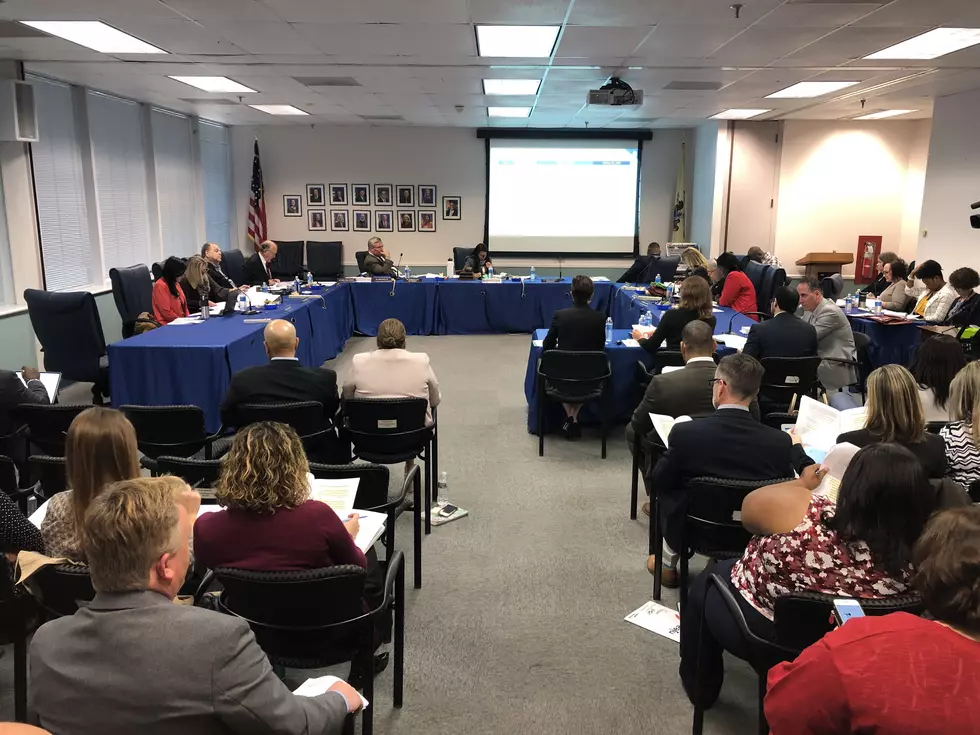
NJ plan: Skip 10th grade standardized tests, add geometry to math exam
New Jersey high school students wouldn't have to take state standardized tests as sophomores, but graduation tests they take as juniors would include geometry as well as Algebra I, under a compromise proposal advanced Monday by the State Board of Education.
The board voted 12-1 to formally propose the change, putting it on track for final approval around February, nearly three weeks after pausing to push for amendments. The Department of Education agreed to add geometry to the 11th grade assessment, which hadn’t been part of its plan.
The proposal allows students to qualify for graduation by getting a high enough score on alternate standardized exams such as the SAT or ACT, but only after a student first takes the state’s assessment. Students also could graduate without taking the state tests by having a portfolio of their work reviewed.
The rules would apply starting with the current freshman class. The previous, invalidated rules were extended earlier to the current sophomores, juniors and seniors.
“Stakeholders across the state with wide-ranging opinions have come together to find common ground that provides students in grades 7 to 9 with a clear path to graduation and parents and educators with a clear and reasonable expectation,” said Education Commissioner Lamont Repollet.
Federal law requires all students to be tested for accountability purposes in grades 3 to 8 and once in high school. State law says the high school graduation assessment must be administered in 11th grade – though in recent years has been given in 10th grade, an approach now invalidated by the courts.
Students will be tested in 9th grade in math and language arts for accountability reasons, then take the now-in-development replacement graduation assessment starting in 11th grade.
“So the Class of 2023 is the first one that we need to have an 11th grade comprehensive assessment for, and that would be in the school year ‘21-22,” said Lindo Eno, the assistant commissioner for the Division of Academics and Performance.
Eno called the rules regarding alternate routes to graduation without passing the graduation exam “a fair and equitable policy call on an area that’s gray” and said the DOE prefers that students take the test.
“There’s a process that one must go through when they’re in high school,” Repollet said. “If you’re not meeting those high school requirements, then you’re not eligible to actually access the portfolio. So you have to come to school. You have to make sure that you’re doing right in the classes, make sure that you’re on track. If you meet all those requirements, then you can take that portfolio assessment. So there’s safeguards in place to ensure that kids get to that level of at least achieving minimum proficiency.”
“It’s very important that all students avail themselves of this junior level test when possible, unless it’s in their IEP or there are cognitive difficulties or reasons that would preclude them,” said Kathy Goldenberg, the board president. “And certainly I would anticipate that districts would follow suit in that, also, as it is the clear intention – I think, the way I interpret the statues and the codes that follow – that kids, students, should avail themselves of the assessment tests.”
Some board members expressed concern that 11th graders are being asked to take too many standardized exams – graduation tests on top of the college entrance exam. They want the Legislature to change state law requiring the graduation assessment to be done in 11th grade.
“A number of these young people are going to be taking the SATs and the ACTs and all of testing that we know is part of the 11th grade,” said board member Mary Beth Berry. “Are we concerned that a lot more children, and their parents will be supportive, of them opting out?”
Repollet said he is not concerned about 11th grade opt-outs because it will be the graduation requirement, not optional as it was this past year.
Board vice president Andrew Mulvihill said a 10th grade test would be preferable because it gives students who need it more time for remediation. It also would mean students – who in some cases take Algebra I in 8th or 9th grade – would be tested on a subject they have specifically studied in years.
“I think that we’ll all acknowledge that this isn’t the best that we can do for the state of New Jersey and the children,” said Mulvihill, the only board member to vote against publishing the proposal. “This is the best we can do within the circumstances that have been presented to us. And I just think that that’s a shame, and that’s not right.”
Board member Ronald Butcher said the proposal is part of a larger discussion about graduation rules.
“There are legislative fixes that would give us the ability to work on that. If nothing else, give us some flexibility so we can get into it,” Butcher said. “Right now, we’re dealing with a court decision and with legislation that’s put us in a corner and in a box to a degree. Get us out of the box and let the educators determine what’s best for education.”
More From WOBM News:
More From 92.7 WOBM










